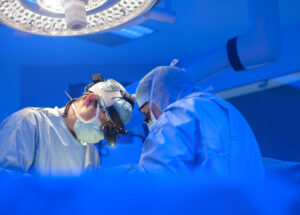Around 15% of cardiac surgery patients experience excessive bleeding, often due to a depletion of coagulation factors. Up to 30% of cardiac surgery patients receive frozen plasma to help stabilize hemostasis. In early phase clinical trials, four-factor prothrombin complex concentrate (PCC), a purified concentrate of coagulation factors II, VII, IX, and X derived from pooled plasma, has shown to be promising for cardiac surgery patients who have coagulopathic bleeding. The Factor Replacement in Surgery II (FARES II) phase 3 trial at 12 sites in Canada and the U.S. compared the safety and efficacy of PCC to frozen plasma. Briefly, 420 adult patients (median age, 66 years; 74% male) with excessive bleeding after cardiopulmonary bypass surgery were randomized; 213 patients received PCC (1500 IU <60 kg; 2000 IU >60 kg) and 207 received frozen plasma (3 units <60 kg; 4 units >60 kg). PCC was more effective than frozen plasma—78% of patients in the PCC arm compared to 60% in the frozen plasma arm did not need additional hemostatic treatments. The PCC arm received fewer transfusions (RBC, platelets and frozen plasma combined) compared to the frozen plasma arm in the 24 hours after surgery—6.6 units vs. 9.3 units (p=0.002), respectively; and fewer patients who received PCC had adverse events compared to those who received frozen plasma. Future studies with a longer follow-up and more rigorous cost analyses are needed to further compare PCC to frozen plasma.
References:
- Karkouti K, Callum JL, Bartoszko J, et al. Prothrombin Complex Concentrate vs Frozen Plasma for Coagulopathic Bleeding in Cardiac Surgery: The FARES-II Multicenter Randomized Clinical Trial. Published online March 29, 2025
- Wang R, Bennett-Guerrero E. Is It Time to Replace Plasma With Prothrombin Complex Concentrate in Cardiac Surgery? Published online March 29, 2025

